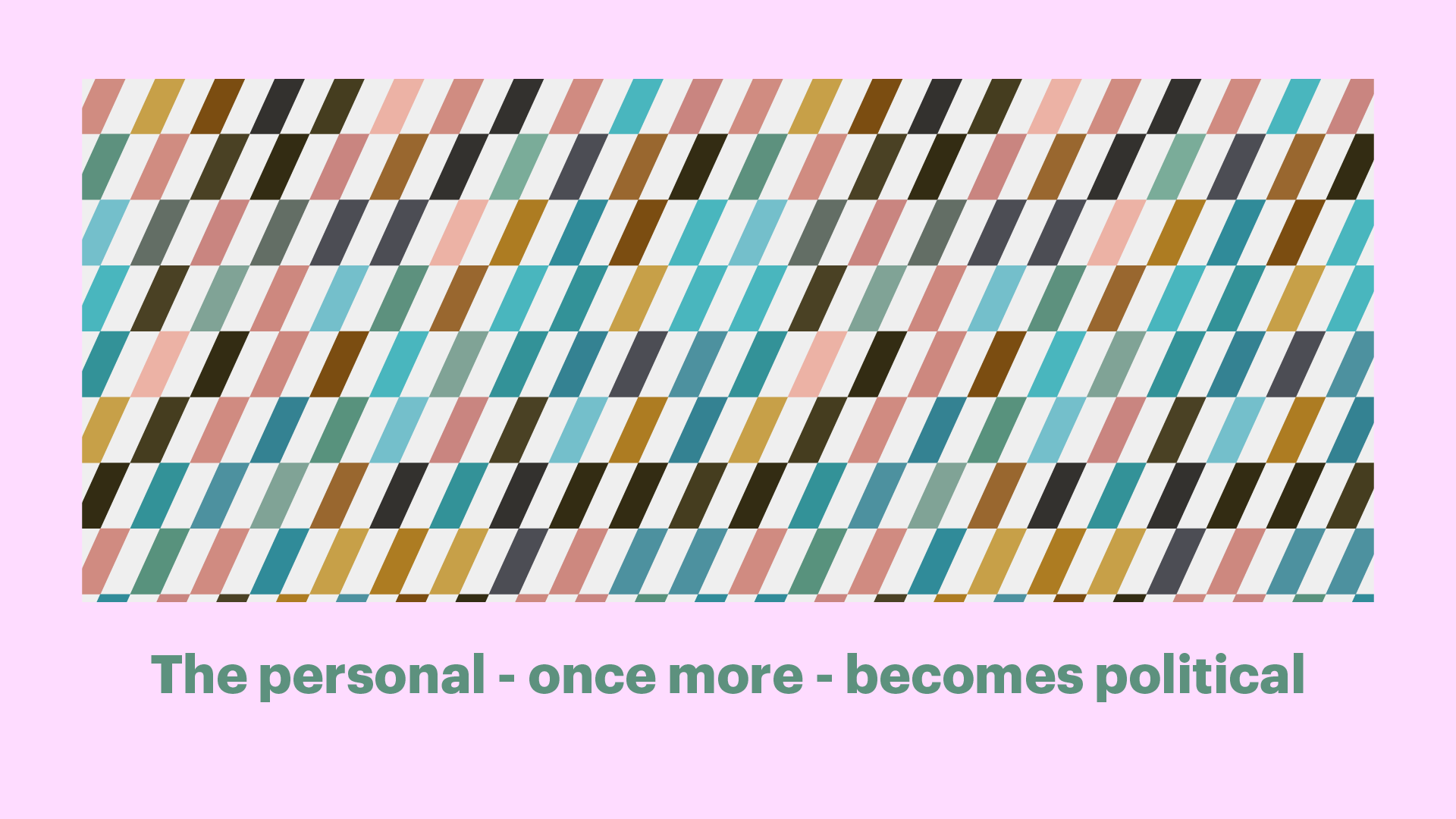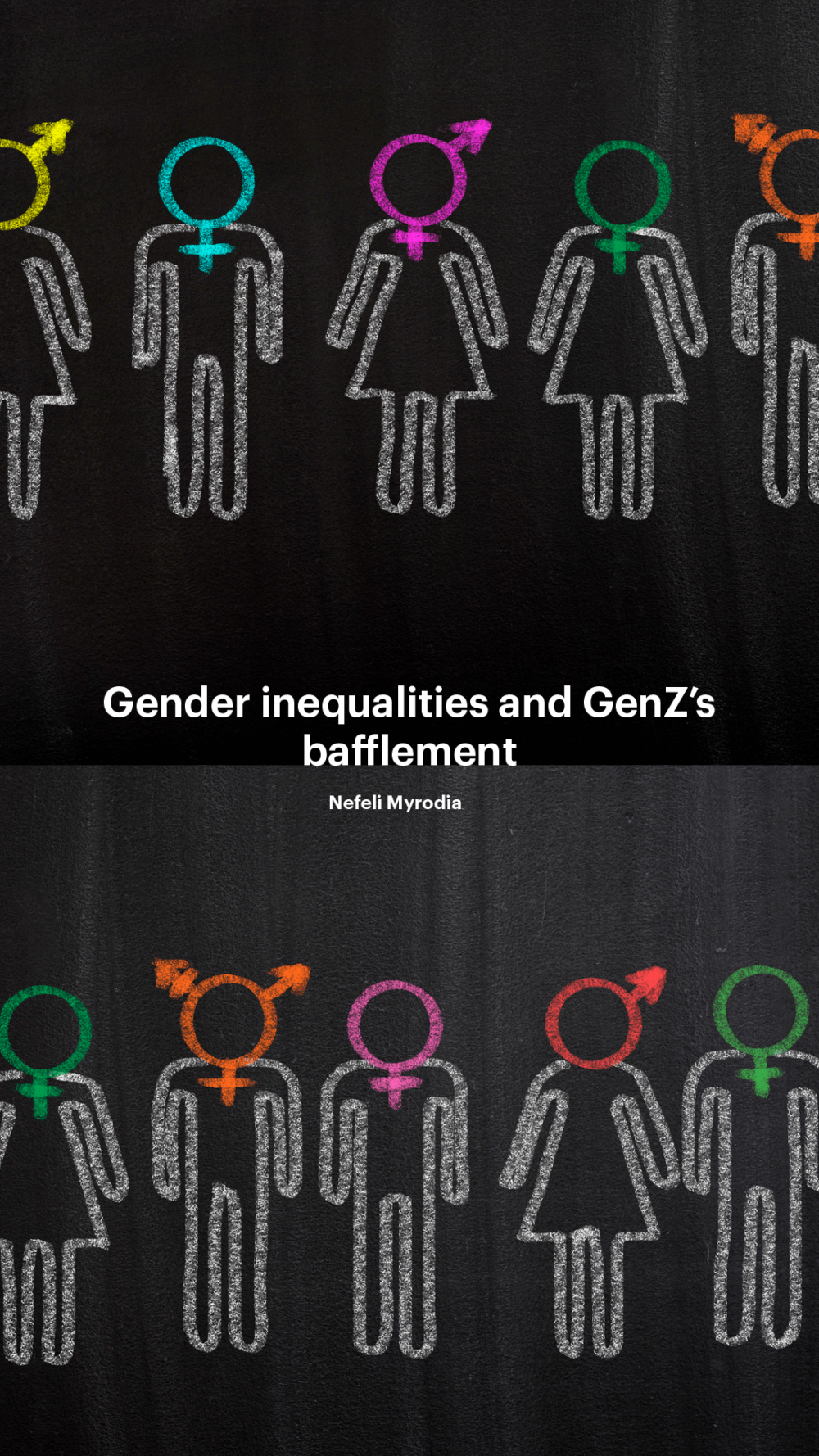
The personal – once more – becomes political
One of the most prevalent messages of the second wave of feminism was that the personal is also political. This credo rejected the confinement of women to a private “apolitical” realm that was home and family life, and decried the monopolisation of public discourse and political power held by men. At the core of this slogan was the assertion of politics as a process of gendered distribution of power, whether in public life and the workplace, or in the private sphere of the home. After decades of struggles and achievements, what does this slogan mean today, and what claims can it express in terms of gender equality?
The nationwide survey that Eteron conducted on a sample of 2,000 people reveals significant aspects of gender dynamics within the context of contemporary families, which can help us answer this question. In this particular survey, participants were asked, among other things, who is most likely to act as a carer of family members. 70.2% of male survey participants said that it is equally likely for men and women to become carers of family members, while only 43.0% of the women surveyed replied the same. A similarly large difference when it comes to the male and female perceptions of the current situation, also emerges on the issue of household chores. The majority of the male population (54.3%) stated that the likelihood of doing household chores is equally shared by men and women. Whereas 72.0% of women believe that women are more likely to take on this responsibility.
The differences in acknowledging the gendered distribution of household tasks and who is the primary carer of family members/ relatives between men and women is not an exclusively Greek phenomenon. A relevant survey conducted in America in 2015 showed similar results, with men claiming that they fulfil their household tasks on an equal level with women, and women stating that they are the ones shouldering the biggest load (Pew Research Center, 2015).
What is the reality, though? In order to map out the time allocation within the household, social research has turned its focus to measuring time use by women and men using what we call “Time Use Surveys” (TUS). Among other things, TUS require that participants record their daily management in diaries, listing their activities every ten minutes over a 24-hour period. The aim is to accurately record participants’ time allocation to different activities, such as paid and unpaid work, rest, transportation and sleep.
In the most recent harmonised European time use survey (HETUS 2010 wave), Greek men’s participation in unpaid work was the second lowest among the 18 participating countries, just above Turkey. More specifically, the male population in Greece appears to spend 2 hours and 13 minutes per day on activities such as meal preparation and ironing, while women spend more than twice as much time on these tasks daily (4 hours and 43 minutes) (EUROSTAT, 2019). Similarly, a TUS conducted by the Hellenic Statistical Authority (ELSTAT) in Greece in 2013-2014, found that women devote “a very substantial part of their time daily to household and family care (4 hours and 24 minutes), while men spend only one and a half hours on the same activities” (Karamessini & Symeonaki, 2016). These findings are in line with TUS in other countries that converge on the conclusion that women spend more hours on household and family care than men (Rubiano-Matulevich & Viollaz, 2019; Campaña et al., 2023). In fact, recent evidence suggests that the pandemic has probably exacerbated the existing inequality in household task distribution (Seedat & Rondon, 2021).
It is worth mentioning that most of the existing research does not even adequately capture a ‘hidden’ aspect of housework, the “mental load”. The mental load describes the mental and emotional work required to anticipate the family’s needs and oversee the smooth running of the household, which is quite different from “manual” household tasks such as washing and picking up laundry (Dean et al, 2022; Roberstonet al., 2019). For example, the psychological load might include the process of organising children’s birthday parties and scheduling & managing medical appointments for relatives. In layman’s terms, mental load is “what is borne by the person who notices that the laundry basket is full or that the toilet paper is running out or that there is no coffee left, and either buys some or informs the other person when they ask ‘do we need anything from the supermarket?’” (Kathimerini, 2023). Although quantification of the mental load is still in its early stages, qualitative findings from American surveys suggest that this dimension of domestic work is also largely undertaken by women (Daminger, 2019).
But why are these inequalities in the private sphere “political”? Because, as second-wave feminists would argue, they directly affect the distribution of power and opportunity between the sexes, much to the detriment of women. For a start, housework is in the vast majority of cases unpaid, and its contribution to the running of the family and the economy is underappreciated – even though women’s contribution through unpaid care and housework is estimated at 9% of global GDP (close to $11 billion) based on recent UN estimates (UN Women, n.d.). As a result, the existing distribution of unpaid housework perpetuates gender stereotypes that place women in a position inferior to men in terms of their social and economic status. Secondly, research has associated unpaid work with declining mental health and a deteriorating quality of life, more so for women than men (Seedat & Rondon, 2021). Moreover, the burden of household responsibilities appears to have a decisive impact on women’s entry and subsequent performance in the labour market, as well as on their participation in public life (International Labour Organization, 2018; Silbermann, 2015). Finally, to put it simply, household chores, as well as the resulting mental load, are exhausting – there is a reason we call them chores.
Some have argued that these inequalities are overcome in the “private sphere” when women gain greater access and higher earnings in the labour market (Bittman et al., 2003). This hypothesis, however, has been disproved to some extent. Research has shown that the unequal distribution of domestic tasks persists even when women work, or even when they earn comparable or higher wages than their partners (Pew Research Center, 2023). Researchers refer to this phenomenon as the “second shift” (Hochschild & Machung, 2012).
What can the State do to balance the inequalities within the household? Addressing this question, a radical claim expressed in the 1970s was the remuneration of housework in the form of a salary provided by the State to housewives (BBC, 2022). Those who expressed this argument argued that such a reform would acknowledge the invisible but enormous contribution of women to the economy. Others, however, have viewed this particular measure with scepticism. One of the major issues at stake here is whether such a reform would indeed substantially reshape gender relations, or would it end up perpetuating women’s association with the private realm of the home and family (Kumaraguru, 2022).
Now let’s look at another proposal: an intervention in the field of primary and secondary education. One such measure, which remains unexplored, is the update and utilisation of home economics courses. Although this course has not received much attention in political debates on equality-oriented reforms, social commentators converge on the view that teaching home economics has the potential to promote gender equality and improve the intra-family division of household labour by training students of all genders to be able to adequately perform household tasks (Branlat and Sano, 2021). Related research in Japan suggests that a reform of home economics in schools in 1990, whereby this subject began to be taught to both male and female students together, with a curriculum free of gender stereotypes, was associated with behavioural changes that contributed to a more balanced distribution of family tasks in students’ adult lives (Hara & Rodríguez-Planas, 2021).
Gender equality starts at home, whether it is the right of women to live their daily lives free from all forms of domestic violence, or the obligation of partners to share equally who will take out the trash and make the grocery list. So, starting from our home, we can and should take a look (on a personal and a collective level) at the hurdles that the (not so apolitical after all) private sphere often raises to women’s inclusion in the political and economic life, and try to make them smaller – one load of washing at a time.
Bibliography / Reference material
BBC (2022) ‘We demand wages for housework’. https://www.bbc.com/news/av/stories-62980454
Bittman, M., England, P., Sayer, L., Folbre, N. & Matheson, G. (2003). When does gender trump money? Bargaining and time in household work. American Journal of Sociology 109(1): 186-214.
Brant, J. & Sano, J. (2021). Creating more equal partnerships: Home Economics education and gender equality in Japan and Norway. In: Comparative Perspectives on Gender Equality in Japan and Norway.
Campaña, J.C., Gimenez-Nadal, J.I. & Velilla, J. (2023). Measuring gender gaps in time allocation in Europe. Social Indicators Research, 165(2): 519-553.
Daminger, A. (2019) The cognitive dimension of household labour. American Sociological Review, 84(4):609–633.
Dean, L., Churchill, B. & Ruppanner, L. (2022). The mental load: Building a deeper theoretical understanding of how cognitive and emotional labour overload women and mothers. Community, work & family, 25(1): 13-29.
EUROSTAT (2019) How do women and men use their time – statistics. https://ec.europa.eu/eurostat/statistics-explained/index.php?title=How_do_women_and_men_use_their_time_-_statistics#Participation_of_women_higher_for_cleaning.2C_cooking.2C_laundry.2C_etc
Hara, H. & Rodríguez-Planas, N. (2021) Long-Term Consequences of Teaching Gender Roles: Evidence from Desegregating Industrial Arts and Home Economics in Japan. IZA Institute of Labour Economics, DP No. 14611.
Hochschild, A. & Machung, A. (2012). The second shift: Working families and the revolution at home. Penguin.
International Labour Organization (2018) Care Work and Care Jobs: For the Future of Decent Work. https://www.ilo.org/global/publications/books/WCMS_633135/lang–en/index.htm
Kumaraguru, Υ. (2022) Wages for housework: a step towards equality at first glance, a step away at second? https://www.kcl.ac.uk/wages-for-housework-a-step-towards-equality-at-first-glance-a-step-away-at-second
Pew Research Center (2015) Raising Kids and Running a Household: How Working Parents Share the Load. https://www.pewresearch.org/social-trends/2015/11/04/raising-kids-and-running-a-household-how-working-parents-share-the-load/
Robertson, L.G., Anderson, T.L., Hall, M.E.L. & Kim, C.L. (2019). Mothers and mental labour: A phenomenological focus group study of family-related thinking work. Psychology of Women Quarterly, 43(2): 184-200.
Rubiano-Matulevich, E.C. & Viollaz, M. (2019). Gender differences in time use: Allocating time between the market and the household. World Bank Policy Research Working Paper, 8981.
Seedat, S. & Rondon, M. (2021). Women’s wellbeing and the burden of unpaid work. BMJ, 374, n1972.
Silbermann, R. (2015) Gender Roles, Work-Life Balance, and Running for Office. Quarterly Journal of Political Science, 10(2):123–153
UN Women (n.d.) Whose time to care? Unpaid care and domestic work during COVID-19.
https://data.unwomen.org/sites/default/files/inline-files/Whose-time-to-care-brief_0.pdf
Kathimerini (2023) Mental load: How much burder can women shoulder nowadays? (in Greek)https://www.kathimerini.gr/k/k-magazine/562667878/mental-load-alitheia-posa-vari-na-sikosei-mia-gynaika-simera/
Karamessini, Μ. & Symeonaki, Μ. (2016)META-ANALYSIS OF THE TUS DATA “Gender Equality in Workforce: The reconciliation of professional and family/ private life into the Greek Industries” (in Greek)
https://www.kethi.gr/sites/default/files/wp-content/uploads/2016/12/%CE%A3%CF%8D%CE%BD%CE%BF%CF%88%CE%B7-%CE%BC%CE%B5%CF%84%CE%B1%CE%BD%CE%AC%CE%BB%CF%85%CF%83%CE%B7%CF%82-%CE%AD%CF%81%CE%B5%CF%85%CE%BD%CE%B1%CF%82-%CF%87%CF%81%CE%AE%CF%83%CE%B7%CF%82-%CF%87%CF%81%CF%8C%CE%BD%CE%BF%CF%85.pdf



